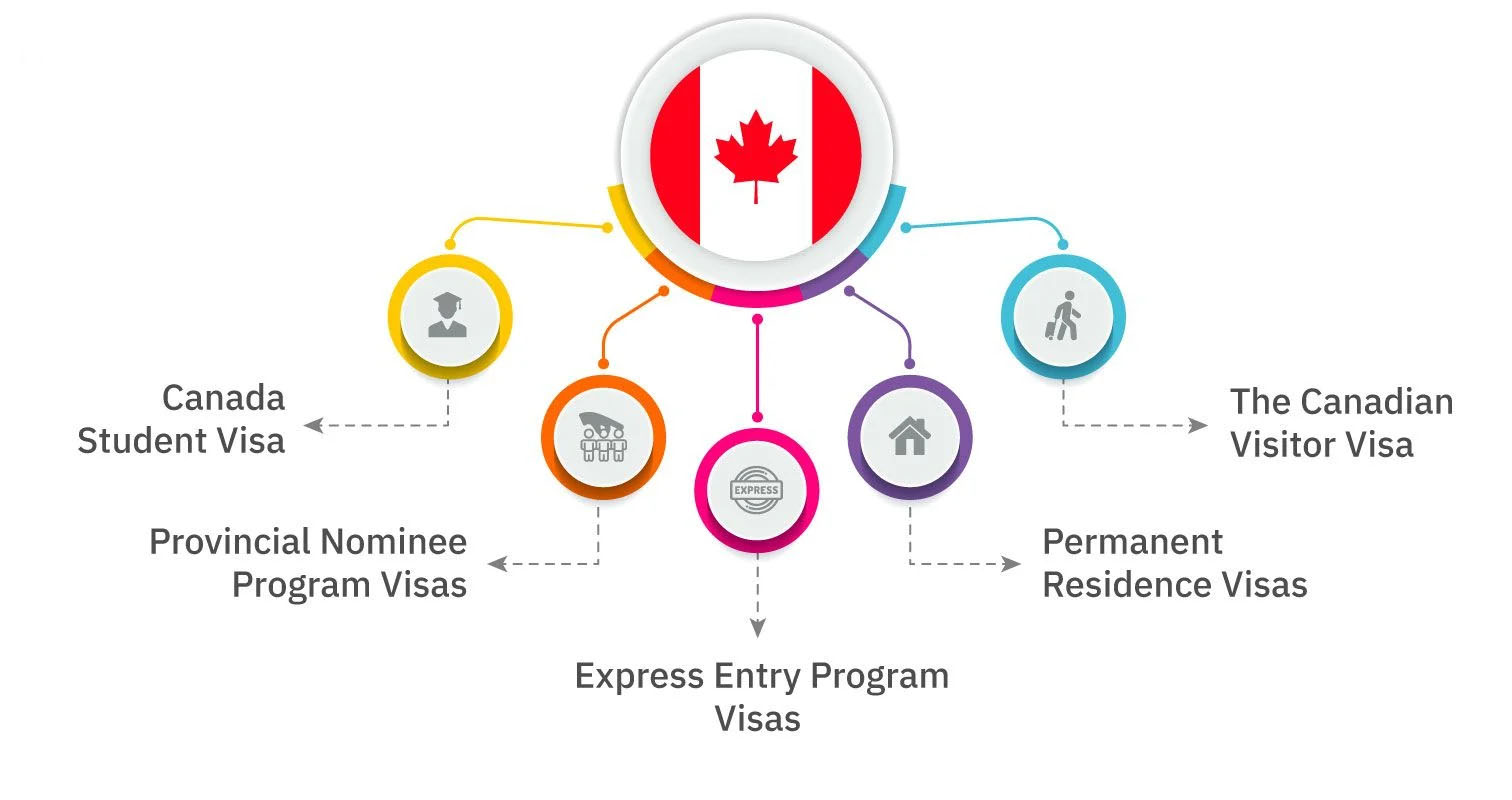Canada Visa Types Canada stands as a premier destination for both immigrants and international students. As outlined in Canada’s Immigration Levels Plan for 2021-2023, the nation has positioned itself to extend invitations to 401,000 immigrants in 2021, an additional 411,000 in 2022, and 421,000 in 2023. Individuals have the opportunity to journey to Canada for temporary employment, pursue higher education, and even accompany others as dependents. Gain further insights into the process of immigrating to Canada, different Canada Visa Types, and how to apply for them!
New IELTS Requirements for Canada SDS
- IELTS requirements for Canada SDS will change starting on August 10, 2023, according to IRCC.
- IELTS test takers utilizing the SDS program will now need to achieve an overall 6.0 band in order to be accepted.
- To emphasize the significance of the test-takers comprehensive abilities, it was decided to remove the individual score of 6.0 bands.
- The most recent modification to the IELTS criteria is intended to provide international students with better possibilities to complete their studies in Canada.
Canada Visa Types

There are different types of Canada Visas for international students and professionals aspiring to work and study in one of the most hospitable nations globally. The entry into the country revolves around four primary routes, encompassing immigration, employment, education, and eventual citizenship.
Work Permit Visa
Aspiring individuals aiming to work within Canada have the opportunity to seek Canadian work permits under categories including temporary workers, business individuals, and students. These permits are categorized into two primary types: open work permits and employer-specific work permits.
Open Work Permits
Open work permits grant candidates the ability to work for any employer, though there are some exceptions to this general rule. Specific eligibility criteria must be met by all applicants in order to obtain a work permit. Presented below is a checklist to help you assess your eligibility:
- An international student who graduated from a (DLI) designated learning institution are eligible for the Post-Graduation Work Permit Program
- Students who are unable to meet the costs of their studies
- have an employer-specific work permit and are being abused or at risk of being abused in relation to your job in Canada
- Applicants who have applied for permanent residence in Canada
- A dependent family member of someone who applied for permanent residence
- Spouse or common-law partner of a skilled worker or international student
- Spouse or common-law partner of an applicant of the Atlantic Immigration Pilot Program
- A temporary resident permit holder
- Worker participating in special programs
Employer Specific Work Permit
An employer-specific work permit authorizes you to work in accordance with the stipulations outlined on your work permit. This document includes details such as the employer’s name, the duration of permissible employment, and the designated work location, if relevant. The type of work permit you should seek is determined by the Immigration, Refugee and Citizenship Canada (IRCC) based on the nature of your occupation.
Student
Students who aim to study in Canada have to apply for a Canadian student permit. There are two pathways for the study permit such as Student Direct Stream or Non-Student Direct Stream. The former is SDS is available for students from developing countries like:
- Antigua and Barbuda
- Brazil
- China
- Colombia
- Costa Rica
- India
- Morocco
- Pakistan
- Peru
- Philippines
- Senegal
- Saint Vincent and the Grenadines
- Trinidad and Tobago
- Vietnam
The key distinction between the SDS and non-SDS pathways lies in the processing time for visas and the quantity of documents needed for the student permit application process.
Immigration
Here are the Canada Visa types for immigration purposes:
- Express Entry
- Family Sponsorship
- Provincial nominees
- Quebec-selected skilled workers
- Atlantic Immigration Pilot
- Caregivers
- Start-up Visa
- Self-employed
Canadian Citizenship
An alternate route for entering Canada involves seeking Canadian citizenship. The Canadian citizenship card typically undergoes a processing period of 12 months. To attain Canadian citizenship, prospective individuals must fulfill the following requirements:
- be a permanent resident;
- have lived in Canada for at least 3 out of the last 5 years (1,095 days);
- must have filed an income tax return;
- pass a citizenship test;
- prove your language skills in English or French.
Canada Dependent Visa
An alternative route to reach Canada is through the Canada Dependent Visa. Individuals have the opportunity to support their husbands, wives, partners, as well as children who are 18 years or older, provided they hold Canadian citizenship, possess permanent residency status in Canada, and are recognized as an Indian under the Canadian Indian Act.
Atlantic Immigration Pilot (AIP) Visa Canada
Next on our list of Canada Visa Types for Indian applicants is the AIP Visa Canada. Introduced in 2017, the Atlantic Immigration Pilot assists businesses and employers in Atlantic Canada in recruiting skilled foreign workers aspiring to relocate to Canada. The initiative welcomes international graduates aiming to remain in Atlantic Canada following their studies. There exist three distinct pathways for immigrants and graduates to submit their applications:
- Atlantic International Graduate Program;
- Atlantic High-Skilled Program;
- Atlantic Intermediate-Skilled Program
| Programs | Eligibility Requirements |
| Atlantic International Graduate Program | Must have a degree, diploma, or another credential from a publicly funded institution in an Atlantic province. Must have lived in an Atlantic province for at least 16 months in the 2 years before getting your degree, diploma or credential must take a language test to show you can communicate in English or French Must have the financial stability to support themselves Work experience is not required for international graduates hired through the Atlantic Immigration Pilot. |
| Atlantic High-Skilled Program | Must have work experience in management, professional or technical/skilled job for at least a year Must have a Canadian high school diploma or equivalent education Have to take a language test in English or French Financial funds to support yourself and your family when you come to Canada |
| Atlantic Intermediate-Skilled Program | Must have work experience for at least a year Must have a Canadian high school diploma or equivalent education Must take a language test to show you can communicate in English or French Financial funds to support yourself and your family when you come to Canada |
Student Direct Service (SDS) Canada Visa
The Student Direct Stream represents a study permit provided by Immigration, Refugees, and Citizenship Canada (IRCC), intended for students hailing from developing countries. Specifically tailored for international students aspiring to undertake advanced education in Canada, this stream facilitates the acquisition of a student permit within 45 days and involves a reduced documentation requirement.
Eligibility Requirement
To be eligible, you need to possess an acceptance letter from a Designated Learning Institute (DLI). A DLI refers to a university or college sanctioned by the government for enrolling international students. At present, only a subset of DLI-approved institutions can admit international students, contingent upon their possession of a Covid-19 readiness plan.
- English proficiency proof like an IELTS score above 6.
- A medical examination and medical insurance.
- Proof of Guaranteed Investment Certificate of CAN$10,000 or more. You can receive this certificate from any IRCC registered bank. Under this, you cannot access your money until you are in Canada, which is then retrieved in a limited amount monthly or bimonthly.
- Proof of payment of first year’s tuition fees
- Residency proof of one of the following countries:
- India
- China
- Philippines
- Vietnam
- Pakistan
- Morocco
- Senegal
FAQs
What is SDS Canada Visa?
The Student Direct Stream stands as a study permit provided by Immigration, Refugees, and Citizenship Canada (IRCC), catering to students hailing from developing countries. Tailored particularly for international students desiring advanced studies in Canada, this stream offers advantages over a standard permit, as students can secure the permit within 20 days and the documentation requirements are reduced.
What is an IRCC Canada Visa?
IRCC is an acronym for Immigration, Refugees, and Citizenship Canada. This governmental organization undertakes various responsibilities, such as overseeing the entry of immigrants, providing refuge to refugees, and delivering initiatives to aid newcomers in establishing themselves in Canada. Additionally, IRCC bestows citizenship and manages the issuance of passports for Canadian citizens. You can find further information about IRCC on their official website: https://www.canada.ca/en.html
Can my spouse or common-law partner on dependent visa work in Canada?
Spouses and common-law partners on dependent visas can work and apply for their own Canadian work permit.
What is the processing time for a Canada work permit?
The processing time for a work permit in Canada is 32 weeks.
What is the processing time for a Canadian student permit?
The processing time for a student permit is 13 weeks.
What are the Canada Visa types?
Canada offers a number of visa types for temporary, permanent, and leisure purposes.
Applicants can apply for a Canada tourist visa, Canada student permit, Canada work permit, etc to stay and live in the country.
